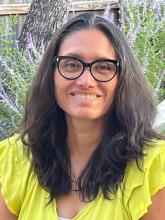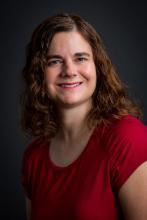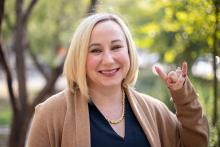Student Success

Implementation of a new student initiative: Promoting Student Success and Well-Being (ASEE Gulf-Southwest)
Former PTF chair Nina Telang co-presented this paper at the American Society of Engineering Education (ASEE) Gulf-Southwest Annual Conference in March 2021. This paper shares a detailed look into the implementation of a new student initiative focused on promoting student success and well-being.
Read the complete paper here, or find the abstract below.

Effectiveness of the Supplemental Instruction Program in First-Year Engineering Courses - A Longitudinal Report (ASEE)
Former PTF chair Nina Telang co-presented this paper at the American Society of Engineering Education (ASEE) Annual Conference in June 2019.

Drivers Exercise
Before deciding what your career goals are, it’s critical to know what you value most in a job. What gets you out of bed to go to start the day, go to work, and/or live your life? This exercise will help you define and prioritize what drives you. We provide definitions of 8 common "drivers". Once you understand these drivers, you can take the exercise and go through a ranking process to determine which are most important to you (i.e. you’re less likely to compromise on these) and which are less important (i.e. you’re more willing to compromise on these).
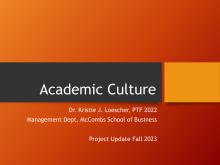
Teaching as Well Being (UT System)
On April 11, 2024, three Provost's Teaching Fellows presented at the final session of the "Teaching as Wellbeing" mini-conference series, hosted by the UT System Academy of Distinguished Teachers in collaboration with UT System faculty developers. The series served as a monthly think tank about the relationship between teaching, learning, and wellbeing for educators and educational developers across UT system.
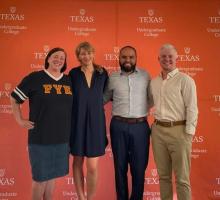
Be Well to Do Well (Signature Course Resource)
This video project was designed to be shown in all Signature Courses at UT. Together with a discussion prompt, the video aims to acquaint students with mental and physical health resources on campus, and to teach them strategies for success.

Academic Culture in McCombs School of Business
Project goal:
Elevate excellence in the classroom through new strategies to understand, measure, and improve rigor in all courses
Project objectives:
Each class is designed and delivered with the expectation of students learning at high levels
Each student is supported so they can accomplish learning at high levels
Each student demonstrates learning at high levels
Outcome:
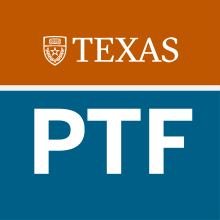
The “Social/Wellness Module:” Providing Space for Wellbeing and Social Learning for Incoming UT Students
My project addresses the lack of built-in social/wellness-oriented interactions in introductory courses for


